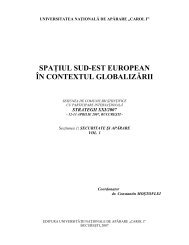PROVOCĂRI LA ADRESA SECURITĂŢII ŞI STRATEGIEI LA ÎNCEPUTUL SECOLULUI XXI
provocări la adresa securităţii şi strategiei la începutul secolului xxi
provocări la adresa securităţii şi strategiei la începutul secolului xxi
Create successful ePaper yourself
Turn your PDF publications into a flip-book with our unique Google optimized e-Paper software.
It should challenge other allies to offer similar funding, including<br />
support for Central and Eastern European members to transfer the lessons of<br />
their security sector transition to these other partners [33].<br />
The Black Sea region, with its position right at the heart of Eurasia,<br />
stands to reap great benefits from increasing global geostrategic importance<br />
[34]. The geostrategic position of Romania in the zone starts being<br />
perceived at its true importance [35].<br />
If the revival of PfP will fail [36], there are likely to be serious<br />
destabilizing consequences throughout the EAPC region, and NATO will<br />
find it increasingly difficult to fulfill its tasks Balkan, Afghanistan and Iraq<br />
missions.<br />
NOTES:<br />
[1] Special Issue on NATO Summit Istanbul, Turkey, June 28 and<br />
29, 2004.<br />
[2] Ibidem.<br />
[3] Dickey Christopher, Surrender monkey-not, Newsweek, 2003,<br />
Oct 6, p: 41.<br />
[4] Viktor Glebov, Security Trends in the Black Sea Area: Regional<br />
Co operations, Romanian Journal of International Affairs, Vol. IV, 1998,<br />
p.23-27.<br />
[5] Armen Liloian, Basic Facts and Developments in Nagorno-<br />
Karabakh, Romanian Journal of International Affairs, Vol. IV, 1998, p.59.<br />
[6] Karapet Roubinian, On the Nagorno-Karabakh Conflict,<br />
Romanian Journal of International Affairs, Vol. IV, 1998, p.67.<br />
[7] The response from Sukhumi was combative. "An attempt by the<br />
Georgian administration to export the Rose Revolution to Abkhazia, as has<br />
been done in Ajaria, would be doomed to failure," Vyacheslav Eshba, the<br />
Abkhaz defense minister, told Interfax.<br />
[8] Abashidze is a former Communist official who is descended from<br />
a family that ruled Adzharia when the region was under Turkish control as<br />
part of the Ottoman Empire. During those centuries, most of the people of<br />
Adzharia -- who are ethnic Georgians and speak the Georgian language --<br />
converted to Islam. Most Georgians in other regions are Orthodox<br />
Christians. This history contributes to Abashidze's hold on power.<br />
[9] U.S. Department of State, Bureau of European and Eurasian<br />
Affairs, Washington, DC, February 17, 2004.<br />
[10] The Foreign Military Financing Program provides the Georgian<br />
military with defense articles, services and training. FMF also promotes<br />
Georgian's participation in NATO's Partnership for Peace program (PfP).<br />
[11] The Russian leaders Secretary Powell talked to hear his message<br />
loud and clear. On certain issues they provided immediate feedback. For<br />
example, they stressed that they fully recognized Georgia's sovereignty and<br />
supported its territorial integrity. “We believe that Russian-Georgian<br />
relations now have an opportunity to take a turn for the better”. Newly<br />
elected Georgian President Saakashvili has invited President Putin to visit<br />
Tbilisi in the fall to sign a Russian-Georgian framework cooperation<br />
agreement that should be ready by that time. In the meantime, we are urging<br />
the two sides to agree on a timetable for the withdrawal of Russian forces<br />
from their bases in Georgia, in accordance with Russia's 1999 Istanbul<br />
commitments. How Russia approaches these negotiations will be an early<br />
indicator of how Russia intends to deal with the new Georgian leadership.<br />
Russia still considers certain parts of the Black Sea as a zone for unilateral<br />
influence and hindering international community from active involvement in<br />
conflict settling in the region. Unfortunately, in some cases international<br />
community looks with patience at Russia attempts to maintain the militarypolitical<br />
influence on the territory of the former Soviet Union. Since 1991,<br />
when Georgia declared its independence, Russia several times interfered in<br />
its domestic affairs militarily. From 1993, Russian military policy towards<br />
Georgia has the goals to legalize the presence of Russian troops on its<br />
territory. The Russia army on the territory of Georgia always stays in the<br />
core of the local conflicts, either backing one of the sides or playing the role<br />
of a “third force”.<br />
[12] David Darchiashvili, Russian Policy in the Black Sea Area:<br />
Sources of Conflicts (Georgian Case), Romanian Journal of International<br />
Affairs, Vol. IV, 1998, p.48.<br />
[13] Secretary of Defense Donald Rumsfeld visited Moldova, a<br />
country where the cold war never ended. Mr. Rumsfeld said clearly that<br />
“Russia's troop presence violates the revised Treaty on Conventional Forces<br />
in Europe and post-Soviet guarantees Russia made to withdraw military<br />
forces from the territories of its neighbors”. Daniel C. Twining is a director<br />
at the German Marshall Fund of the US, Beware Russia's pocket empire,<br />
Christian Science Monitor. Boston, Mass.: Jul 1, 2004, pg. 09.<br />
[14] Moreover, we recently have seen Russia adopt a more assertive<br />
stance toward its neighbors. This new policy is reflected in Russia's<br />
unilateral diplomacy in Moldova, where a cooperative framework to help<br />
resolve the Transnistrian dispute already exists, in Russia's highly visible<br />
297<br />
298



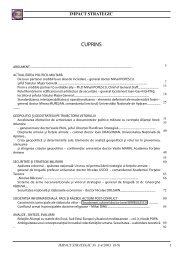

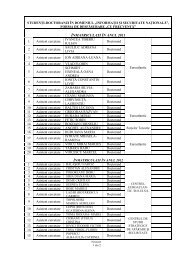
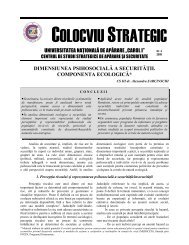
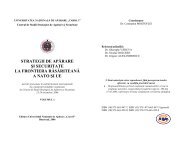
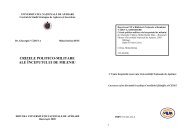
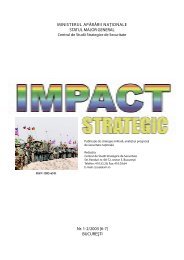


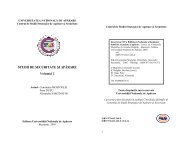
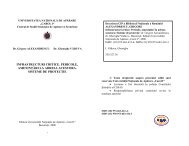
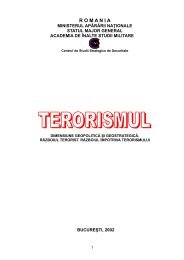

![„CAROL Nr 4 [29]/2008](https://img.yumpu.com/53801719/1/184x260/carol-nr-4-29-2008.jpg?quality=85)
